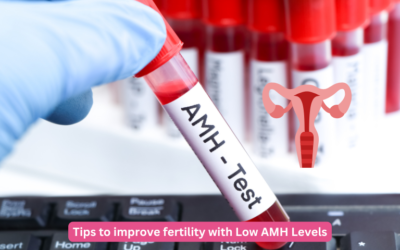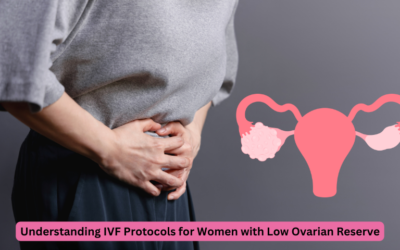Polycystic Ovary Syndrome (PCOS) is one of the most common endocrine disorders affecting women of reproductive age. Characterized by irregular menstrual cycles, elevated androgen levels, and polycystic ovaries, PCOS can significantly impact a woman’s fertility. At Shukan Hospital and IVF Centre, we provide specialized care to help women manage PCOS and improve their chances of conception. This guide explores the relationship between fertility and PCOS, covering causes, symptoms, diagnosis, treatment options, lifestyle changes, and recent research.
Understanding PCOS
What is PCOS?
- Definition: PCOS is a hormonal disorder affecting 1 in 10 women of reproductive age. It involves the presence of multiple small cysts on the ovaries, irregular menstrual cycles, and elevated androgens.
- Pathophysiology: The exact cause is unknown, but PCOS is linked to insulin resistance, chronic inflammation, and genetic factors. Elevated insulin levels may increase androgen production, disrupting ovarian function.
Symptoms of PCOS
- Menstrual Irregularities: Infrequent, irregular, or prolonged menstrual cycles.
- Hyperandrogenism: Excess facial and body hair, severe acne, and male-pattern baldness.
- Ovarian Cysts: Multiple small follicles that fail to mature and ovulate.
- Metabolic Issues: Weight gain, obesity, and difficulty losing weight.
- Skin Changes: Darkening of the skin, especially in the neck creases, groin, and underneath the breasts.
Impact of PCOS on Fertility
Anovulation
- Mechanism: Anovulation occurs when the ovaries do not release an egg during a menstrual cycle, making natural conception impossible.
- Contributing Factors: Hormonal imbalances disrupt the development and release of mature eggs.
Hormonal Imbalance
- Androgen Excess: High androgen levels interfere with the development of ovarian follicles, leading to irregular or absent ovulation.
- LH/FSH Ratio: An imbalance between luteinizing hormone (LH) and follicle-stimulating hormone (FSH) affects follicle maturation.
Insulin Resistance
- Impact on Ovulation: Insulin resistance increases insulin levels, which can elevate androgen production, exacerbating ovulation issues.
- Metabolic Consequences: High insulin levels contribute to weight gain and further hormonal imbalances.
Endometrial Dysfunction
- Irregular Cycles: Irregular menstruation can lead to an overgrown endometrial lining, creating a less favorable environment for embryo implantation.
- Endometrial Thickness: Proper endometrial thickness is crucial for successful implantation and pregnancy maintenance.
Diagnosing PCOS
Medical History and Physical Examination
- History: Detailed medical history focusing on menstrual irregularities, weight changes, and symptoms like hirsutism and acne.
- Physical Exam: Examination for signs of androgen excess, such as excess hair growth, acne, and male-pattern baldness.
Ultrasound
- Ovarian Examination: Transvaginal ultrasound to check for the presence of multiple small follicles and assess ovarian size.
- Endometrial Thickness: Evaluation of the endometrial lining to ensure it is appropriate for implantation.
Blood Tests
- Hormone Levels: Measurement of androgens, LH, FSH, and insulin levels to identify hormonal imbalances.
- Metabolic Profile: Additional tests for glucose tolerance and lipid profile to assess metabolic health.
Rotterdam Criteria
- Diagnostic Criteria: Diagnosis of PCOS requires at least two of the following three features:
- Irregular or absent menstrual cycles.
- Elevated levels of androgens or clinical signs of hyperandrogenism.
- Polycystic ovaries visible on ultrasound.
Treatment Options for PCOS-Related Infertility
Lifestyle Modifications
- Weight Management: Even modest weight loss (5-10% of body weight) can improve insulin sensitivity, reduce androgen levels, and restore ovulation.
- Healthy Diet: Focus on a balanced diet rich in fruits, vegetables, whole grains, and lean proteins. Avoid processed foods and high-sugar items.
- Regular Exercise: Engage in at least 150 minutes of moderate-intensity exercise per week to improve insulin sensitivity and aid weight loss.
Medications
- Clomiphene Citrate: Often the first line of treatment to induce ovulation. It works by stimulating the release of hormones necessary for ovulation.
- Letrozole: An aromatase inhibitor that is also effective in stimulating ovulation. Studies have shown it can be more effective than clomiphene in some women with PCOS.
- Metformin: This medication improves insulin sensitivity and can help regulate menstrual cycles. It is often used in combination with other fertility treatments.
- Gonadotropins: Injectable hormones used if oral medications are not effective. They directly stimulate the ovaries to produce and release eggs.
Assisted Reproductive Technologies (ART)
- Intrauterine Insemination (IUI): Sperm is directly inserted into the uterus around the time of ovulation, increasing the chances of fertilization.
- In Vitro Fertilization (IVF): Eggs are retrieved from the ovaries, fertilized in the lab, and the resulting embryos are transferred to the uterus. This method bypasses many of the ovulatory issues associated with PCOS.
- Ovarian Drilling: A laparoscopic surgery where small holes are drilled into the ovaries to reduce androgen production and trigger ovulation.
Lifestyle Changes to Improve Fertility in PCOS
Dietary Adjustments
- Low Glycemic Index (GI) Foods: These foods help manage blood sugar levels and improve insulin sensitivity. Examples include whole grains, legumes, and non-starchy vegetables.
- Anti-Inflammatory Diet: Incorporate foods with anti-inflammatory properties, such as omega-3 fatty acids (found in fish and flaxseeds), antioxidants (found in berries and leafy greens), and spices like turmeric and ginger.
Physical Activity
- Regular Exercise: Aim for at least 30 minutes of moderate exercise most days of the week. Activities like walking, swimming, and cycling are excellent choices.
- Strength Training: Incorporate strength training exercises to build muscle mass, which can help improve insulin sensitivity.
- Stress Management: Techniques such as yoga, meditation, and mindfulness can reduce stress, which can negatively impact hormonal balance and fertility.
Supplements
- Inositol: This supplement, particularly myo-inositol and d-chiro-inositol, has been shown to improve insulin sensitivity and support ovarian function.
- Vitamin D: Ensure adequate vitamin D levels, as deficiency is common in women with PCOS and can impact reproductive health.
- Omega-3 Fatty Acids: These healthy fats can help reduce inflammation and improve metabolic health. Consider fish oil supplements or incorporating fatty fish into your diet.
Coping with the Emotional Impact of PCOS and Infertility
Emotional Support
- Counseling: Seeking help from a mental health professional can provide strategies to manage the emotional stress associated with PCOS and infertility.
- Support Groups: Joining support groups where you can connect with others facing similar challenges can offer comfort and a sense of community.
Mind-Body Techniques
- Meditation and Mindfulness: These practices can help reduce stress and improve overall emotional well-being.
- Acupuncture: Some studies suggest that acupuncture may improve fertility outcomes by reducing stress and enhancing blood flow to the reproductive organs.
Advances in Research and Future Directions
Genetic Research
- Understanding PCOS: Ongoing research into the genetic basis of PCOS aims to uncover the underlying mechanisms, which could lead to more targeted and effective treatments.
- Personalized Medicine: Advances in genetics may allow for personalized treatment plans based on an individual’s genetic profile.
Innovative Treatments
- New Medications: Researchers are developing new medications that target the underlying causes of PCOS, such as insulin resistance and inflammation.
- Combination Therapies: Combining different treatments, such as lifestyle interventions with medications, may improve outcomes for women with PCOS.
Role of the Gut Microbiome
- Microbiome Research: Emerging research suggests that the gut microbiome may play a role in the development and management of PCOS.
- Probiotics and Prebiotics: Future treatments may include probiotics and prebiotics to modulate the gut microbiome and improve metabolic and reproductive health.
Conclusion
Navigating fertility challenges with PCOS can be daunting, but with the right support and treatment, many women can achieve their dream of becoming a parent. At Shukan Hospital and IVF Centre, we are committed to providing comprehensive care tailored to the unique needs of women with PCOS. From lifestyle modifications and medications to advanced reproductive technologies, our team is here to support you every step of the way. By staying informed, seeking support, and working closely with your healthcare provider, you can improve your chances of successful conception and a healthy pregnancy.
For more information or to schedule a consultation, please visit our website or contact us directly. Let us help you on your journey to parenthood.
Author Bio
Dr. Prakash Patel
He is a highly respected Infertility and IVF Specialist with an extensive medical career spanning over two decades. As the Director of Shukan Hospital & IVF Centre, he has dedicated his life to helping couples achieve their dreams of parenthood. He is renowned for his expertise in advanced laparoscopic surgeries and has successfully managed numerous complex cases involving recurrent miscarriages and recurrent IVF failures. His proficiency in high-risk pregnancy management and advanced IVF treatments makes him a trusted name in the field of reproductive medicine.
His approach to patient care is deeply compassionate, combining his vast clinical knowledge with a commitment to personalized treatment. He holds prestigious certifications from leading medical institutions in France and Croatia, reflecting his dedication to staying at the forefront of medical advancements. With memberships in notable organizations like FOGSI and ISAR, He is recognized both nationally and internationally for his contributions to gynecology and reproductive health.
Under his leadership, Shukan Hospital & IVF Centre has become one of the premier fertility centers in Gujarat, known for its state-of-the-art facilities and patient-centered care. His outstanding work has earned him several accolades, including the My FM Achiever Award, further cementing his reputation as a leading specialist in his field.
References:
- “Polycystic Ovary Syndrome: Clinical and Molecular Advances.” Clinical Endocrinology.
- “Insulin Resistance in Polycystic Ovary Syndrome: Mechanism and Management.” Diabetes Care.
- “The Role of Androgens in Polycystic Ovary Syndrome.” Journal of Clinical Endocrinology & Metabolism.
- “Lifestyle Interventions in Women with Polycystic Ovary Syndrome.” Cochrane Database of Systematic Reviews.
- “Pharmacological Treatments for Polycystic Ovary Syndrome.” Journal of Reproductive Medicine.
FAqs
Can women with PCOS conceive naturally without medical intervention?
Yes, many women with PCOS can conceive naturally. However, it may take longer due to irregular ovulation. A healthy lifestyle and managing symptoms can improve the chances of natural conception.
Does PCOS only affect overweight women?
No, PCOS can affect women of all body types. While obesity can exacerbate symptoms, lean women with PCOS may also experience irregular cycles and other symptoms.
Is it possible for PCOS symptoms to change over time?
Yes, PCOS symptoms can vary throughout a woman’s life. Factors like age, weight, and lifestyle can influence symptom severity.
Can diet alone manage PCOS symptoms effectively?
While diet plays a significant role in managing PCOS, it is usually most effective when combined with exercise and, in some cases, medication.
Are birth control pills a suitable long-term treatment for PCOS?
Birth control pills are commonly prescribed to regulate menstrual cycles and reduce androgen levels. They are safe for long-term use but may not be suitable for everyone.
How does PCOS affect pregnancy outcomes?
Women with PCOS may have a higher risk of complications like gestational diabetes, preeclampsia, and preterm birth. Close monitoring and management can help ensure a healthy pregnancy.
Can PCOS symptoms improve after pregnancy?
Some women experience an improvement in PCOS symptoms after pregnancy, but this is not guaranteed. Hormonal changes post-pregnancy can affect symptom severity.
Is hair loss due to PCOS reversible?
Hair loss due to PCOS can sometimes be managed and partially reversed with treatments like minoxidil, hormonal therapies, and lifestyle changes.
Can PCOS lead to other health issues besides infertility?
Yes, PCOS is associated with an increased risk of developing type 2 diabetes, cardiovascular diseases, and metabolic syndrome.
Are there alternative therapies that can help manage PCOS symptoms?
Some women find relief from PCOS symptoms through alternative therapies like acupuncture, herbal supplements, and naturopathy, although more research is needed to confirm their efficacy.
Does having regular periods mean a woman with PCOS is ovulating normally?
Not necessarily. Even with regular periods, women with PCOS may not ovulate every cycle. Tracking ovulation through methods like basal body temperature or ovulation tests can provide more accurate information.
Is there a cure for PCOS?
There is currently no cure for PCOS, but symptoms can be effectively managed with a combination of lifestyle changes, medications, and other treatments. Ongoing research aims to better understand and treat the condition.
Blogs related to Female Infertility
Tips to improve fertility with Low AMH Levels
Low AMH (Anti-Müllerian Hormone) levels indicate a reduced ovarian reserve, which can impact a woman’s fertility. While low AMH levels are often...
Understanding IVF Protocols for Women with Low Ovarian Reserve
In the field of reproductive medicine, one of the significant challenges we face is treating women with low ovarian reserve. As an expert in IVF (In...
The Relationship Between Stress and Infertility
Infertility is a challenge that affects millions of couples worldwide, often bringing with it a rollercoaster of emotions. While the physical...




